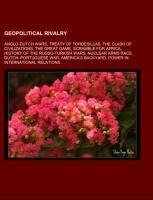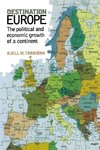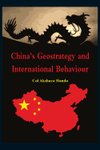
-
 Anglický jazyk
Anglický jazyk
Geopolitical rivalry
Autor: Source: Wikipedia
Source: Wikipedia. Pages: 51. Chapters: Anglo-Dutch Wars, Treaty of Tordesillas, The Clash of Civilizations, The Great Game, Scramble for Africa, History of the Russo-Turkish wars, Nuclear arms race, Dutch-Portuguese War, America's Backyard, Power in international... Viac o knihe
Na objednávku
16.38 €
bežná cena: 18.20 €
O knihe
Source: Wikipedia. Pages: 51. Chapters: Anglo-Dutch Wars, Treaty of Tordesillas, The Clash of Civilizations, The Great Game, Scramble for Africa, History of the Russo-Turkish wars, Nuclear arms race, Dutch-Portuguese War, America's Backyard, Power in international relations, Franco-Austrian Alliance, Inter caetera, China's peaceful rise, Anglo-Austrian Alliance, Treaty of Zaragoza, Foundations of Geopolitics, The New Great Game, Diplomatic Revolution, Anglo-Prussian Alliance, Regional hegemony, France-Habsburg rivalry, 1890 British Ultimatum, G-Zero, Pink Map, Austria-Prussia rivalry, Fashoda syndrome, Treaty of Versailles, Anglo-Prussian Convention. Excerpt: The Scramble for Africa, also known as the Race for Africa or Partition of Africa was a process of invasion, occupation, colonization and annexation of African territory by European powers during the New Imperialism period, between 1881 and World War I in 1914. As a result of the heightened tension between European states in the last quarter of the 19th century, the partitioning of Africa may be seen as a way for the Europeans to eliminate the threat of a Europe-wide war over Africa. The last 59 years of the nineteenth century saw transition from 'informal imperialism' of control through military influence and economic dominance to that of direct rule. Attempts to mediate imperial competition, such as the Berlin Conference (1884-1885), failed to establish definitively the competing powers' claims. Many African polities, states and rulers (such as the Ashanti, the Abyssinians, the Moroccans and the Dervishes) sought to resist this wave of European aggression. However, the industrial revolution had provided the European armies with advanced weapons such as machine guns, which African armies found difficult to resist (with the exception of the Abyssinians, who were indeed successful). Also, unlike their European counterparts, African rulers, states and people did not at first form a continental united front although within a few years, a Pan-African movement did emerge. David Livingstone, early explorer of the interior of Africa.The Portuguese had been the first Europeans to firmly establish settlements, trade posts, permanent fortifications and ports of call along the oceanic coasts of the African continent, from the beginning of the Age of Discovery, in the 15th century. European exploration of the African interior began in earnest at the end of the 18th century. By 1835, Europeans had mapped most of northwestern Africa. In the middle decades of the 19th century, the most famous of the European explorers were David Livingstone and H. M. Stanley, both of whom mapped v
- Vydavateľstvo: Books LLC, Reference Series
- Rok vydania: 2012
- Formát: Paperback
- Rozmer: 246 x 189 mm
- Jazyk: Anglický jazyk
- ISBN: 9781157064978







 Nemecký jazyk
Nemecký jazyk 
 Ruský jazyk
Ruský jazyk 



